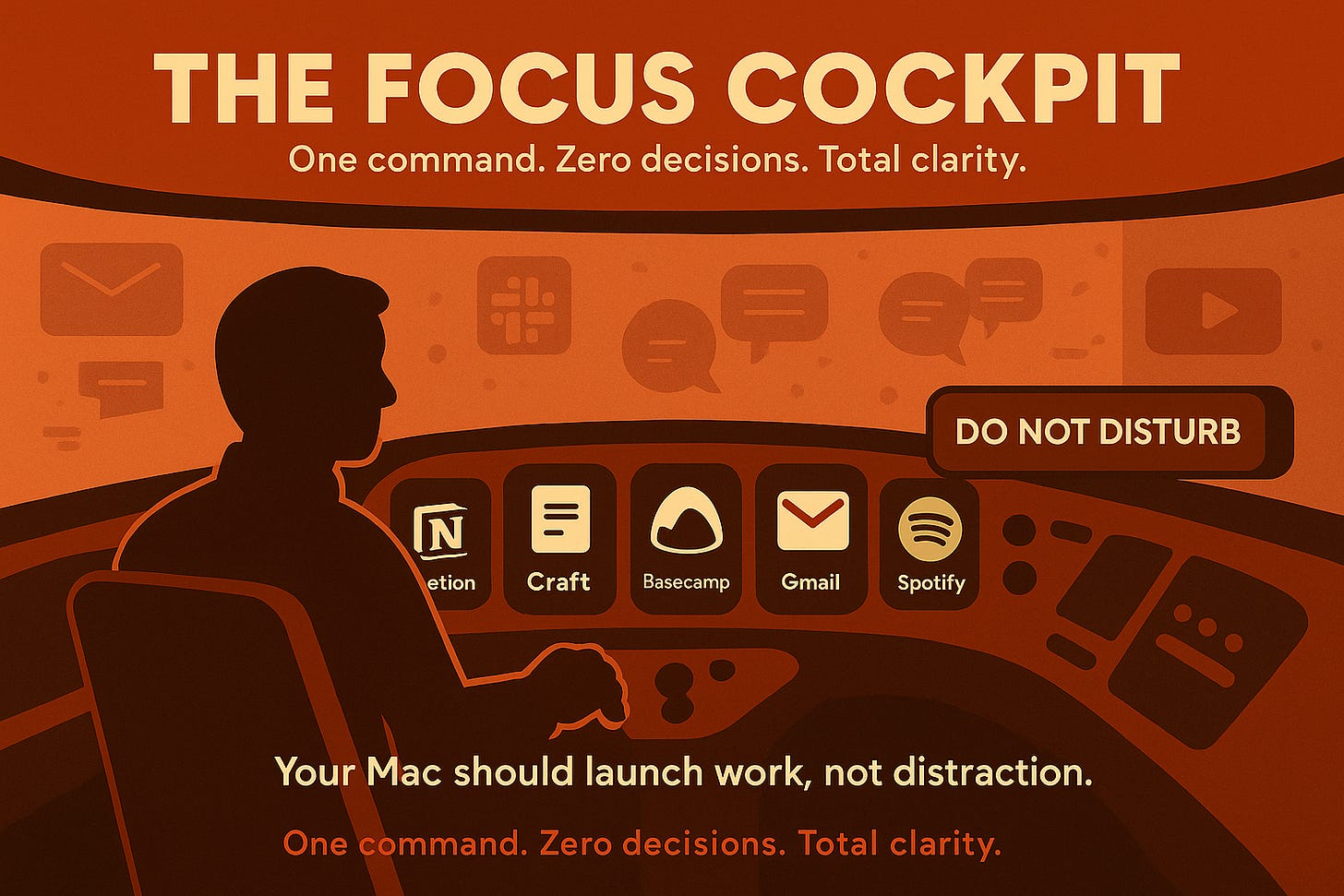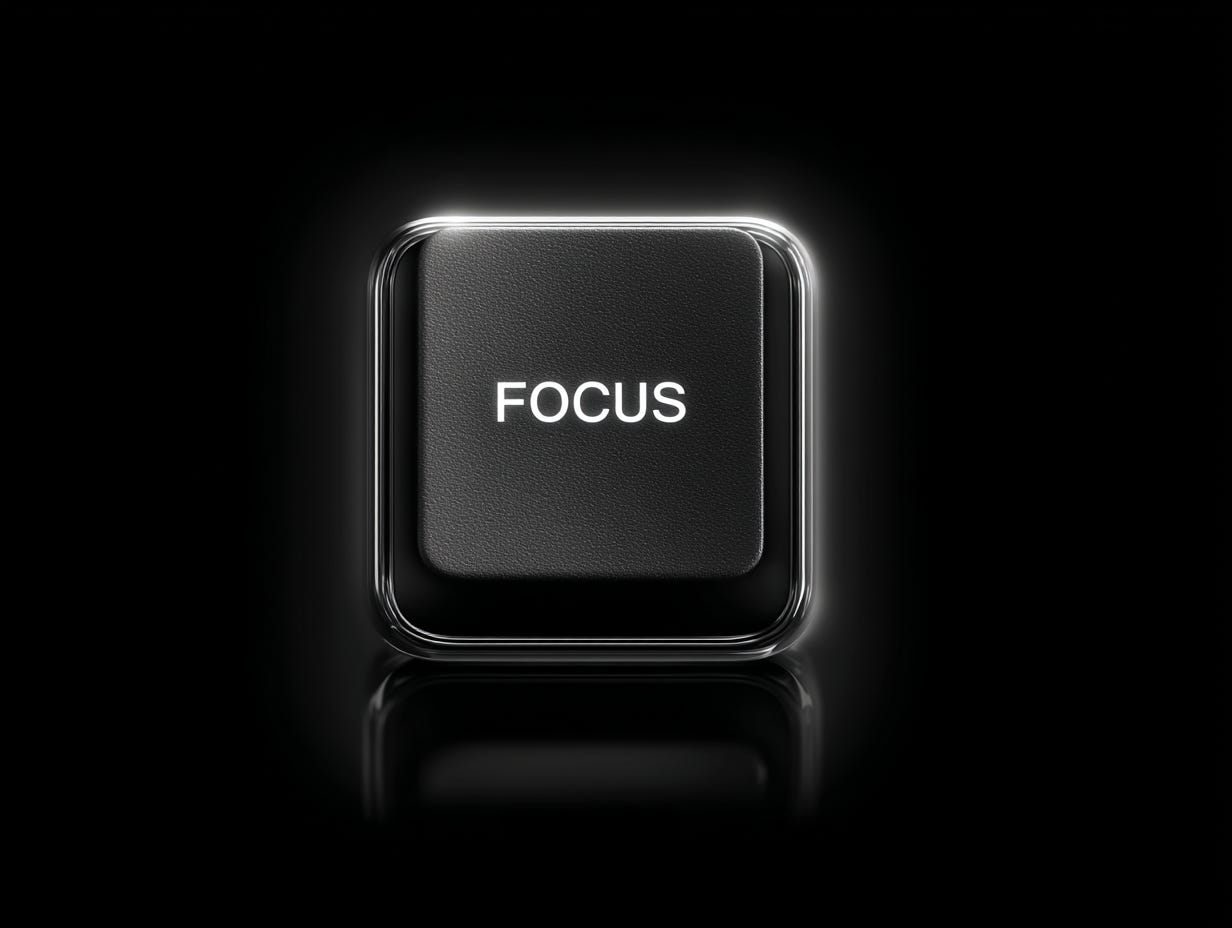Your Mac Should Launch Work, Not Distractions
I hit Cmd+Space and start typing "plan."
The first result shows "Planning Session." I hit enter.
My Mac instantly opens my Focus HQ Notion dashboard, today's Craft notes app, Basecamp, Gmail, and starts my "Deep Planning" Spotify playlist. Do Not Disturb flicks on. My entire planning environment appears in under five seconds.
Most people waste fifteen minutes every work session.
Clicking around like they're a sugar starved child hunting for Easter eggs. Open this app. Find that tab. Where's yesterday's draft? Which Notion page was I on? What playlist helps me think?
By the time you've assembled your tools, your brain's already scattered across seventeen directions. You've started in inbox mode, not focus mode.
The Hidden Tax on Deep Work
You sit down to write that important proposal.
First, you need to open your notes app. Then your project management tool. Oh, and you should probably check if the client emailed any updates. Wait, what was their brief again? Let me just open those research tabs from yesterday...
Twenty minutes later, you're reading Substack Notes and X threads about productivity whilst your actual work sits untouched.
Here's what nobody tells you: those twenty decisions aren't preparation. They're death by a thousand cuts to your mental energy.
Each micro-choice triggers what neuroscientists call "decision fatigue." Your brain burns glucose making trivial choices about which app to open, which tab to find, which notification to dismiss. By the time you reach your actual work, you're already running on cognitive fumes.
The Startup Sequence Principle
Pilots don't improvise their pre-flight routines. They follow identical startup sequences because unpredictability kills performance when it matters most.
Check instruments. Start engines. Configure navigation. Test communications. Every flight, same sequence, same order.
Your work deserves the same intentional startup sequence. But most people treat their digital workspace like a teenager's bedroom. Chaotic. Reactive. Different every time.
The solution isn't better organisation. It's eliminating the organisation entirely.
What if your work environment appeared instantly, identically, every single time? No decisions. No hunting. No accidental detours through your inbox.
Four Environments That Actually Matter
Here's the breakthrough: you don't do random work. You do predictable types of work that require predictable tools.
When I'm planning my week, I always need the same five things: my weekly dashboard, today's notes, project overview, urgent emails, and thinking music. Always. Why am I clicking around hunting for them like it's some kind of surprise?
When I'm deep in coding, it's always the same stack: my code editor, GitHub, project notes, instrumental music, and zero notifications. The tools never change. Only the specific files do.
The pattern holds for any knowledge work. Design sessions. Client calls. Admin tasks. Even recovery time.
The Compound Effect of Instant Setup
Most productivity advice obsesses over optimising the work itself. Better note-taking systems. Smarter task management. More efficient workflows.
But they're missing the biggest drain: the friction before the work begins.
Eliminate setup friction and something magical happens. You stop procrastinating by accident. You can't scroll social media when your work environment launches automatically. You can't check email when your notifications are pre-configured for the task at hand.
You land in focus mode by default, not by willpower.
The Setup I Actually Use
I now have four environment launchers mapped to my Focus Modes:
Planning sessions (Off-road mode)
Deep work sessions (Sports mode)
Admin tasks (Eco mode)
Recovery time (Park mode)
Each opens with three keystrokes. No setup decisions. No cognitive overhead. No accidental inbox visits.
The compound effect over a week is staggering. I've eliminated roughly 90 minutes of setup faff and preserved the mental energy that used to leak away before my real work began.
Your brain doesn't have to make twenty micro-decisions before you can think clearly.
Here's the uncomfortable truth: if you're still opening apps one by one, you're working harder than necessary.
Your work already follows patterns. You just haven't automated them yet.
Until next time,
Dave



